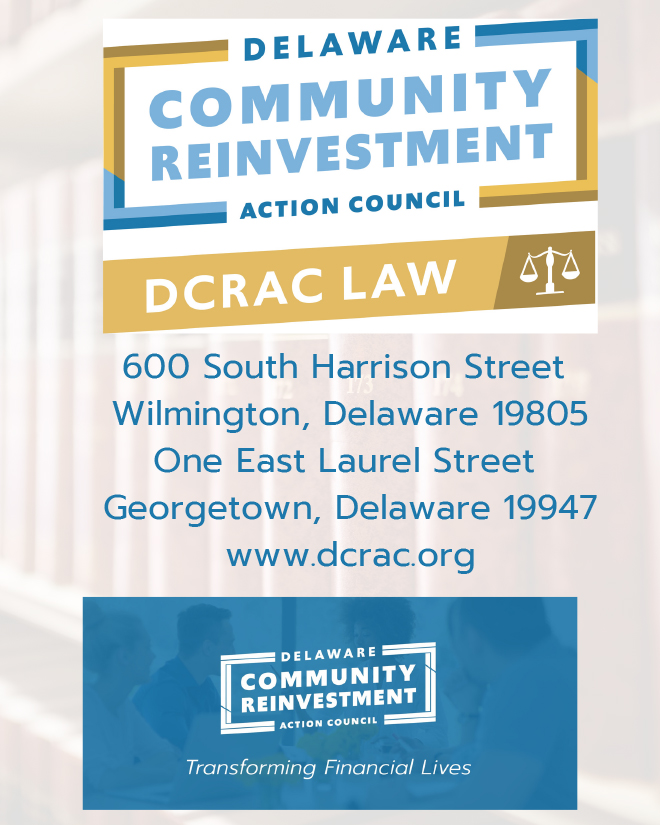Property? Don’t Get Your Title In A Tangle!

By Jaclyn Quinn, Esq.
Delaware Community Reinvestment Action Council, Inc.
If you own real estate, you have a deed, also referred to as title, in your name. In Delaware, this deed is on file with the Recorder of Deeds office in the county where the property is located. There are many circumstances and life changes that can affect property ownership—but when ownership is or becomes unclear, or if the owner of record turns out to be someone else, we call that a “tangled title.” In these cases, the owner must follow specific legal procedures to update or correct public records.
Deed and title issues are unfortunately quite common—but there are key steps you can take to promptly ensure your ownership records are accurate and to prevent future problems.
Divorce can quickly tangle a title—but it is avoidable
Divorcing couples commonly split assets, which may include jointly owned real estate. In that event, the property should be legally transferred to one of the owners solely, so there’s no question of ownership. If there is an outstanding mortgage on said property, the mortgage first needs to be resolved—that is, paid off, refinanced, or assumed by one party—so that the person relinquishing their ownership is no longer liable for the mortgage, in addition to other obligations like property taxes or insurance. Because this process can be lengthy and expensive, many people never take the final steps of a deed transfer—but if one of the legal owners on the deed passes away, they (or, more accurately, their estate and heirs) may still owe money on the property, or contest ownership going forward. In other words, complete the entire deed transfer process when dividing assets to avoid ambiguity around who has a legal or financial interest in the property.
Death causes more tangled titles than nearly any other life event
A property owner’s appointed executor or next of kin must go to the Register of Wills in the county where the person lived to open an estate. This process, called probate, ensures that ownership—both of the property and of the owner’s other assets—passes to their heirs or next of kin correctly. Once the estate is open, the Register of Wills follows the deceased’s valid Last Will and Testament. If someone dies without a will, the law of Intestate Succession steps in to determine how assets should be divided based on family relationships. Once the new owner is identified by one of these procedures, the property’s title will reflect its new, correct owner—who then must address any outstanding mortgage and debts on the property, as well as all taxes, utilities, and insurance payments. Otherwise, they risk losing the property. Sometimes, a Confirmatory Deed is filed in addition to the probate process, indicating who the new owner is and how they came to be owner to further avoid ambiguity.
Multiple heirs to a deceased owner can cause an even larger tangle in the chain of title
In cases where a property owner has multiple heirs or complicated arrangements, they must be diligent in keeping their will updated and maintaining clear answers as to who has or will inherit which interests in the property. Unfortunately and too often, probate attorneys must manage situations where multiple people with ownership interest in real estate pass away at different times, without properly probating the estate of the original owner. For instance: Mom owned the house and passed away, and her basic will left the property to her four adult children, one of whom continued to live in the house and kept paying all the bills for several years, while one of her brothers passed away and left his interest in the property to his three children. All six owners will now need to agree and sign paperwork to do anything with the property in the future, from selling it, to applying for mortgage assistance. Even when the parties are not adversarial, such a situation can get complex quickly, especially as additional marriages, deaths, or heirs are added to the web of ownership.
Whatever your situation, the bottom line is this: Take timely action, create a solid, up-to-date estate plan to avoid complicated real estate issues in the future, and prioritize prompt action and clear succession planning to avoid complications that may jeopardize ownership.
If you need legal advice, Jaclyn Quinn is licensed to practice law in Delaware. She and her colleagues at the Delaware Community Reinvestment Action Council are available to assist in cases like these and others. For more information, or to schedule a consultation, please call (302) 298-3251 or email Jaclyn at [email protected]. For more information, visit www.dcrac.org.
Bio
Jaclyn Quinn, Esq. joined the Delaware Community Reinvestment Action Council (DCRAC) in 2011, first as a volunteer, then as staff. In 2014 Jaclyn opened and grew her private practice until 2019, when DCRAC Law opened to the community. DCRAC Law is a nonprofit law firm providing tax, title, and other legal services to those unable to pay market rates.
Jaclyn graduated with a B.A. in Political Science from The College of New Jersey before moving to Delaware to pursue her J.D. at Widener University- Delaware Law School. She was admitted to the Delaware Bar in 2012, and is also barred in U.S. Tax Court and U.S. Immigration Court. She has volunteered with the Office of the Child Advocate, DVLS, and assists as pro bono counsel in a variety of cases.
Jaclyn Quinn, Esq. Delaware Community Reinvestment Action Council (DCRAC)
302-298-3251 [email protected] www.dcrac.org
@dcracdelcra on instagram & @DCRACDelCRA on facebook
600 South Harrison Street, Wilmington, Delaware
One East Laurel Street, Georgetown, Delaware


